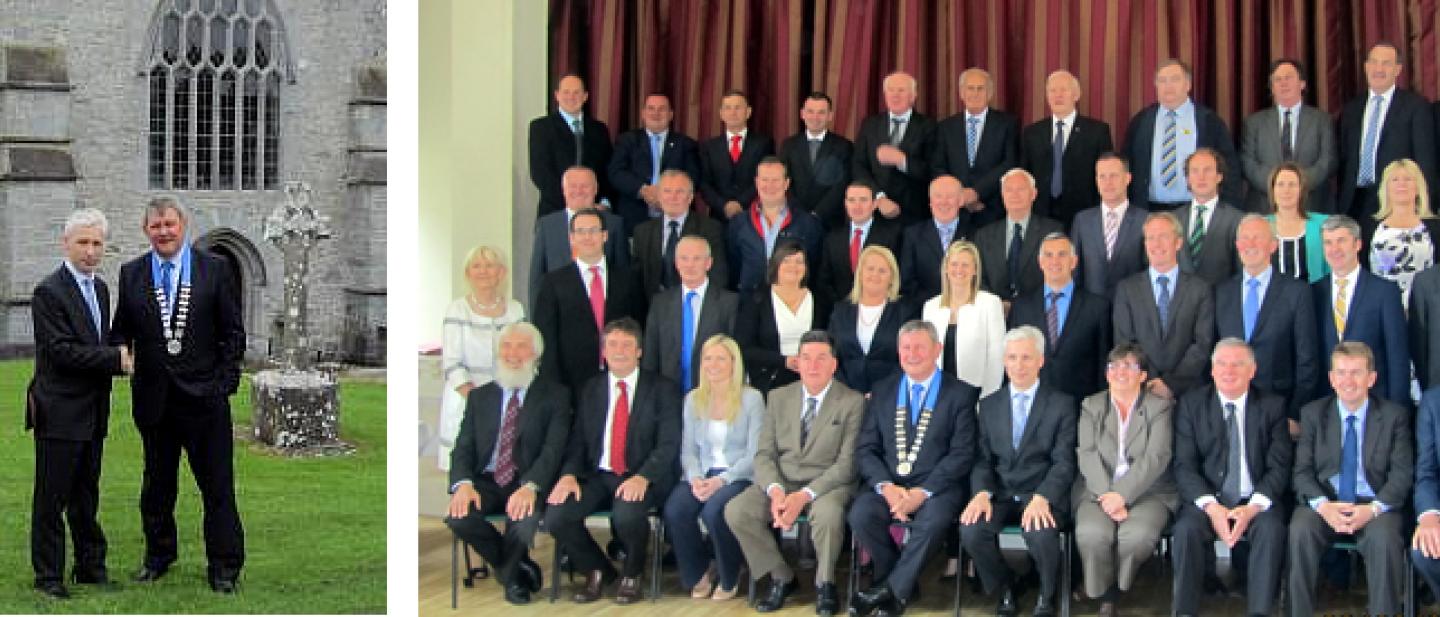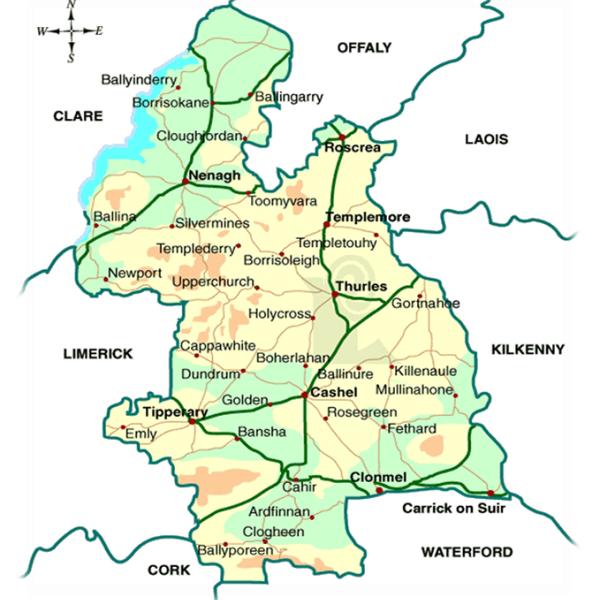Tipperary County Council was established under the Local Government Reform Act 2014. Today there are 40 elected members representing 5 Municipal District of Clonmel, Carrick-on-Suir, Cashel-Tipperary, Templemore-Thurles and Nenagh, and a staff of over 1,000. The inaugural meeting was held on Friday 30th May 2014 in the Community Hall, Holycross, Co. Tipperary.

The main Civic centres of Tipperary County Council are located in Clonmel and Nenagh with Municipal District offices also located in both these centres together with Carrick-on-Suir, Tipperary and Thurles. A new integrated model for customer support across the unified Tipperary County Council was introduced on the same day as the new Council came into being on 1st June 2014.

Tipperary County Council, as the Local Authority for Tipperary, provides an extensive range of infrastructural services, and plays an active role in the development of the county’s industry, business, social, arts, heritage and cultural affairs. It also functions as the regulatory body for certain matters at local level.
Tipperary County Council performs both a representational and an operational role because the Irish system of Local Government encompasses both democratic representation and public administration.
Delivery of services within the County is the Collective responsibility of the elected members and the Executive;
The Representational role is performed directly by the elected members of the Council, which gives them the authority and legitimacy to speak and act on behalf of their communities;
- Tipperary County Council has 40 elected members from 5 Municipal Districts within the county
- The Cathaoirleach is elected from the membership of the Council, at the statutory Annual Meeting of the Council which is held in May/June of each year.
- The wide range of functions performed by the elected representatives, called ‘reserved functions’ , lay down the framework of policy under which the Chief Executive operates.
- Such functions include;
-the adoption of all major policy and operational programmes including
-the County Development Plan,
-the Annual Budget,
-The Corporate Plan,
-the setting of commercial rates (ARV) and varying the rate of Local Property Tax;
-Making of bye-laws; - The Council makes its decisions by “Resolution” at its meetings.
The Operational Role of Tipperary County Council is performed by the Chief Executive and his staff but Day to day operational decisions called ‘Executive functions’ are a matter for the Council Executive but must have regard to the policy direction determined by the elected members; typically executive decisions include;
- all staff matters,
- planning decisions,
- housing allocations,
- budgetary controls, and
- asset management;
The Chief Executive makes his decisions by written “Chief Executive Order” and in making his decisions, must act in a way that is consistent with the policy which has been established by the elected members.
Tipperary County Council has 4 main roles:
- Service Provider
- Provider/facilitator of infrastructure
- Regulator
- Facilitator of economic and community development
Services are provided by Tipperary County Council under the following eight programme groups:
- Housing and Building
- Roads and Transportation
- Water Supply and Sewage
- Planning and Development
- Environmental Protection
- Recreation and Amenity
- Agriculture, Education, Health and Welfare
- Miscellaneous Services
The Council is responsible for direct provision of services such as:
- Social Housing, direct provision & loans/grants
- Parks, Libraries, Swimming Pools, Arts and Cultural Facilities
- Delivery of infrastructure projects such as Roads and community facilities;
- Fire & Emergency Services
- Cemeteries
- Public Lighting, Public Realm and Public Conveniences
- Traffic Management
- Water Supply and Maintenance (under a Service Level Agreement with Irish Water)
Regulatory role
- Planning Policy and Control of Development; enforcement, unfinished housing developments and dangerous buildings;
- Environmental Functions (water, wastewater and waste)
- Heritage (built and natural)
- Casual Trading
- Control of Horses and Dogs
- Control of intoxicating Liquor
- Dangerous Buildings and Places
- Parking
- Waste Management and Anti-Pollution Enforcement
Facilitate the economic and community development of the county by working in collaboration with a variety of agencies and organisations – IDA, Business organisations such as the Chambers of Commerce in relation to retaining and attracting businesses;
- Economic Development
- Environment improvement initiatives
- Major Emergencies
- Sports and Leisure
- Transportation
In areas of social inclusion, policing, sports, arts and culture, we work in partnership with a variety of community and voluntary organisations;
In addition to the foregoing, the following Corporate Support services are provided which facilitate the delivery of all our activities and services:
- Customer Care
- Corporate Communications
- Council Secretarial Services
- Facilities Management
- Financial Services
- Health and Safety
- Human Resource Management
- Information Technology Services
- Property Management
Financing of these services
The Expenditure of Tipperary County Council on provision of services can be classified under two headings:
a) Revenue (or Current) Expenditure – i.e. day to day provision of services e.g. housing maintenance, roads maintenance etc.
The main sources of funding for this expenditure are:
- Government Grants and subsidies
- Commercial Rates
- Goods and Services (e.g. Housing Rents, Housing Loan Repayments, fees and charges for services etc.)
b) Capital Expenditure – i.e. expenditure on creating assets e.g. house building, major road improvement works etc.
The main sources of funding for this expenditure are:
- Capital Grants from Central Government
- Borrowing
- EU Funding
- Other Capital Receipts e.g. Sale of Lands.
How the operations of the Local Authority are regulated
The operations of Local Authorities are regulated by:
- E.U. Directives
- National Legislation
- Local Legislation i.e. Bye Laws
- Adopted Policies of the Council
In addition a range of rules, procedures and guidelines are used by the Local Authority in making its decisions, determinations and recommendations under the many schemes operated by it.
Format of records held by Tipperary County Council
Q: What information does Tipperary County Council keep on record?
A: Recorded information, in any form, including data in computer systems, created or received and
maintained by the Council in the transaction of its’ business or the conduct of its’ affairs, and kept
as evidence of such an activity.
For example, Minutes of Council meetings, statutory and non-statutory plans and schemes, correspondence etc.”


